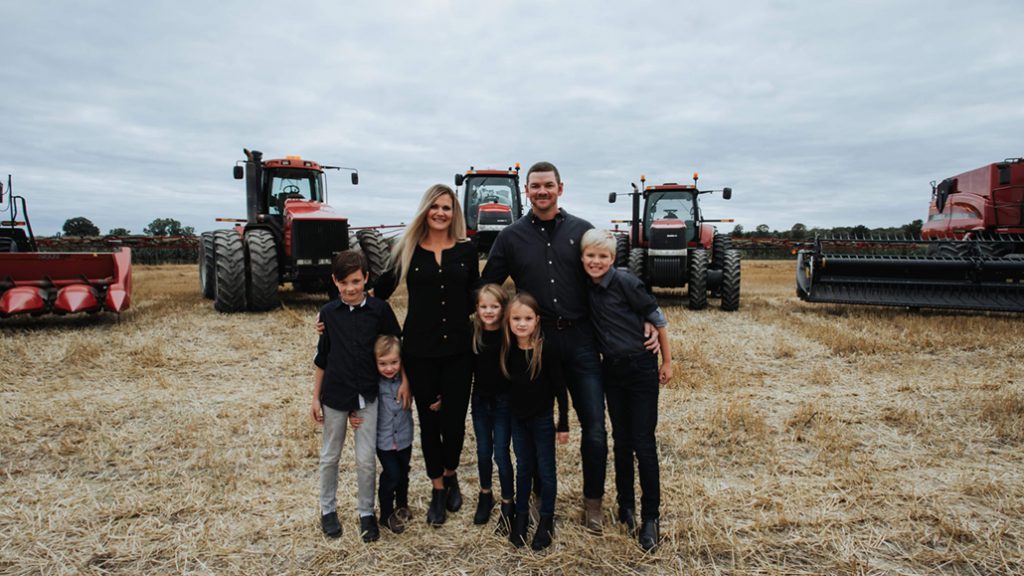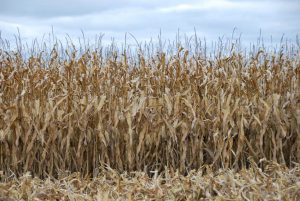Choosing family first
A SUCCESSION STORY: DARCY SMITH

THERE WAS A time when Darcy Smith was adamant he would never farm. As a young teenager, he didn’t like that they worked every day after school and through the weekend and there always seemed to be more work to be done. There was never time to go over to a friend’s house; his dad was rarely able to make it to his hockey games.
“All we ever did was farm,” says Darcy, who along with two brothers and a sister was raised on a dairy and crop farm in Renfrew County.
His parents bought their farm in 1979 — just down the road from the small family farm run by his maternal grandfather. Over the following four decades they bought neighbouring farms — adding fields, a larger herd, an elevator, their own trucks, and a self-storage facility.
Eventually, as he got older and found time to explore the county backroads in a pick-up truck and go goose hunting, Darcy came to realize that a farm is where he wanted to be. He went to Kemptville College to study agriculture, and while there met his wife, Lyndsay. When they finished school, Darcy’s grandfather gave them the opportunity to rent his farmland and prove that they could make a living. Darcy and Lyndsay settled in the farm house and started raising a family.
Darcy was also working with his father who had allowed him to take over the management of the crops. But he wanted to own land and have something to show for all of his work. He didn’t want to wait an unknown number of years to be able to run the farm the way he wanted to.
“I had heard stories about how long succession can take, and I didn’t want to be in my mid-30s and not have something of my own. My friends had degrees, worked in the trades, they were moving up the ladder — and I was still working the farm with a ray of hope that it will all be mine sometime. That’s hard to hold onto when times are tough. Especially when nothing is on paper,” says Darcy, who is now 36.
Luckily, his parents agreed that they shouldn’t wait until they were ready to retire to start the succession process. Ten years ago, they began to talk about how Darcy and his siblings would take on ownership of the farm.
“My parents originally wanted all four kids to be involved on the farm. They planned to have enough land and a house for everyone. It was very unrealistic, but very admirable,” says Darcy.
One of his brothers already had a career at the nuclear power facility, and the other had chosen to go west for a combine tour and eventually drove the ice roads, before marrying into another farm family in eastern Ontario. That left Darcy’s sister to share in the future of the farm.
At first, his sister took care of the dairy side of the farm and Darcy focused on the crops. But after she married, his sister couldn’t commit to staying on the farm. At one point, their parents offered to split the assets and the debt — giving the dairy to his sister and the land and elevator to Darcy. It would have been tight financially, according to the accountant they hired for advice, but it would have been viable. However, his sister declined the offer and moved west.
“There is some distance still between my sister and I, but that’s what can happen if you try to work together without common goals,” says Darcy. “We didn’t have enough respect for each other and there still isn’t enough respect.”
The family had hired an advisor to help build their succession plan, but when they first started out, they didn’t have much direction and asked the advisor to develop different options for them to consider.
“All dad knew is he wanted the next generation to take over the farm but didn’t know how or when or why,” says Darcy. “Looking back, why go into a succession plan if you don’t have all the tools to do it?”
Darcy says they were a lost cause with the advisor because they could never define what they wanted. “It wasn’t a succession planner that got us to our end result, it was just time.”
Time that saw Darcy and Lyndsay add five children to their family, time that saw the passing of relatives and friends much too young, and time that saw his dad realize there was more to life than working on the farm.
“As of August 1, I own everything, even the house my parents live in. That’s what we decided was the best way to do it,” says Darcy. “Whether we had to go this way or not, it was the least sticky.”
In July 2018, they sold the dairy cows and quota, and even though Darcy legally owned a third of the operation, his parents got all the proceeds from the sale which allowed them to pay off debts and make investments that will provide an income through retirement. His parents also wanted their name off the other farm assets as well, and Darcy took out mortgages to finance their purchase.
“My siblings can’t say that I got anything for free. I was the only one to put up money,” says Darcy. “I am the last man standing. They all came and went, and they all hated it, and didn’t like the fact dad worked every day and they figured that meant they had to as well.”
Darcy now grows multiple crops — barley, corn, oats, winter and spring wheat, soybeans, sweet corn, pumpkins, canola — on a combination of owned and rented land. He also provides custom work and helps some of the older farmers in the county manage their fields with anything from buying inputs to arranging sales. Despite all the work he has taken on, Darcy strives to have a better work-life balance than his dad did.
“I farm differently, I work crazy 20-hour days and then take time off. When we work, we work. But when we play, we play.”
Darcy makes time to not only watch his children’s hockey games, but he also coaches three teams as well. They go camping and canoeing.
“Do you farm to live or live to farm? My farm is how I pay my bills. I love it, but at the end of the day if I lose my family over it, it isn’t worth it.”
He doesn’t expect his children to take over the farm, but he wouldn’t be surprised if they did anyway. He is trying to make farm life more enjoyable for them, and they’ve already taken an interest in it — raising chickens, turkeys, cows, and pigs to earn their own money.
Darcy credits his family, particularly Lyndsay, for helping him get through to the other side of the farm transition.
“Everyone’s situation is different, but if I was single when I was going through this, I probably would have thrown my hands in the air and given up. But I had enough roots in the ground to make it through and look where I am now, I have my own farm, the kids are happy and healthy. I couldn’t have it better.” •





















